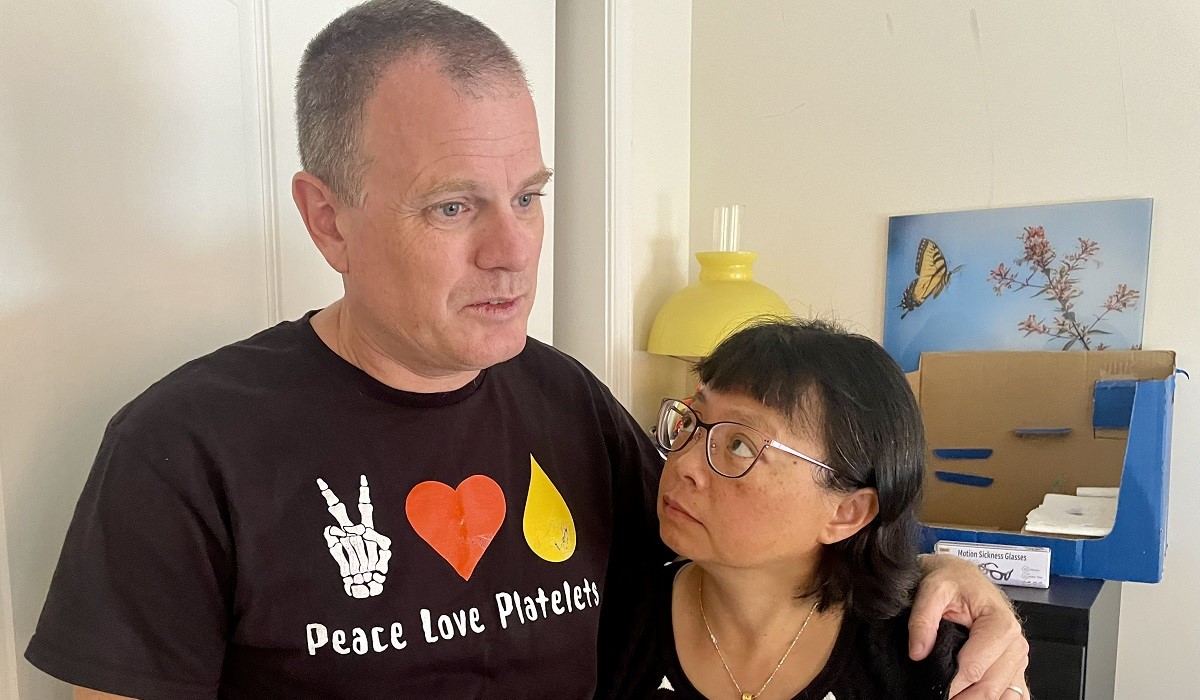
Colin Pitts and Fan Pat of Montgomery County, Md.
17:52 JST, September 18, 2024
There’s a whiteboard beside the quilt-covered bed their daughter has never slept in.
On it are written a few of the promises Colin Pitts and Fan Pat made to a bright-eyed Chinese girl they committed to adopt in September 2019 – things they would do as a family once they received the final permission to bring her to America.
– Read good uplifting story books.
– Play games.
– Make kites.
– Go sledding (and survive).
But now the Maryland couple is facing a crushing prospect: They probably won’t be allowed to keep those promises.
On Sept. 5, China’s Foreign Ministry suddenly, and with little explanation, announced an end to the country’s three-decade-old foreign adoption program, which has sent more than 82,000 children to the United States, more than any other country.
Chinese civil affairs officials “will not continue to process cases at any stage,” the State Department said. That will stop hundreds of families who have been matched with children by Chinese authorities from completing their adoptions, even those in the final stage of what can be a years-long process, adoption advocates said.
The change has injected grief into the lives of once hopeful parents. But many of them, like Pitts, who grew up in Maryland, and Pat, who was born in southern China before moving with her family to Hong Kong, are still trying to hold on.
Sitting in their bright suburban townhouse in Montgomery County 45 minutes north of Washington, the couple is surrounded by photographs of the girl they’ve longed to bring home – and the practical and whimsical steps they’ve taken to get ready for her arrival.
Pitts bought her a kid-size electric guitar. There’s a hand-scrawled sign – at cat-eye level – instructing feline siblings Biscuit and Whiskey to ask her permission before entering her new bedroom, a precaution in case she’s allergic. Inside is a fish-themed reading nook at the top of a ladder, a cozy perch to get away from meddlesome parents – or to peer down at the stuffed raccoon and overstuffed dressers below. Pat bought matching blue blouses crowded with daisies, but that was years ago, and her daughter’s is already too small for her.
“It’s one thing for them to end international adoptions,” Pitts said softly, his wife beside him, noting that the number of kids who end up in orphanages has gone way down. But, breaking into tears, he could only haltingly make it through an appeal for a reprieve for the few hundred families already matched by China with children. “I mean, she knows about us. She called us Mom and Dad. They can’t – they can’t do that. They should – there are 300 of us – just, just make an exception. It would be ending – ending the program on a high note.”
This month, Foreign Ministry spokeswoman Mao Ning offered appreciation to foreign governments and families “for their good intention and the love and kindness they have shown” but argued that China’s move is “in line with the spirit of relevant international covenants.” She noted a few narrow exceptions, such as allowing foreigners to adopt their stepchildren.
Other families – and children – are meanwhile facing anguish on the same scale as Pitts and Pat.
Over the years, adoptions in China have transitioned from mostly healthy girls to children with relatively minor impairments such as a cleft lip to those with more profound disabilities and medical conditions who struggle to find homes domestically, according to Ryan Hanlon, president of the National Council for Adoption, an advocacy group based in Alexandria, Va., making China’s sudden shift even tougher to understand.
Hanlon pointed to the case of a Chinese boy with hemophilia who now stands to lose his chance to move in with the American family eager to adopt him. Their biological child shares the same serious bleeding disorder. “They would have been great parents to this little boy. There’s no reason this needed to end,” Hanlon said.
Jessica Beck, a part-time director at a Baptist church and lamb farmer from northern Baltimore County, has had her family’s attempt to adopt a second boy from China basically frozen since 2020. Fortified by the Bible’s call to care for orphans, she plans to keep pushing.
During one challenging stretch, she shared a meal with some friends. “The dad’s like, ‘At what point do you just give up and walk away?’” Beck recalled. She looked back at him and pointed to one of his daughters. “At what point do you walk away from them?”
The announcement about the halted adoptions came five years to the day since Pitts, 53, and Pat, 50, signed their names in blue ink on their “Letter of Intent to Adopt a Special Needs Child.”
The girl was shy of her ninth birthday and on a special list of China’s most urgent adoptions. They saw through photos and videos the caring way she approached the younger children in her orphanage. She seemed to have an incredible spirit and a can-do attitude, and they were taken by “how easily and genuinely she would just smile,” Pitts said.
“At that point, we were done looking,” he said. They had found their daughter. “That was it. She was the first -”
“- the first and only file we looked at,” Pat said.
They tackled the heavy load of medical consultations required to prove they were ready to raise a child with cerebral palsy, a condition affecting muscle control and the way a person moves. Experts say it sometimes also leads to seizures, problems seeing and speaking, and intellectual disabilities.
The couple found a pediatrician in Germantown, Md., and a team of specialists at Georgetown University Hospital who could help coordinate her care, including intensive physical and occupational therapy, medications, orthotic braces and possible surgeries to correct conditions that could stem from the way her body develops.
They were optimistic that comprehensive treatment would improve her condition. But, if it doesn’t, they wrote to Chinese adoption officials, “this will not change our love or acceptance of [her] in the least. She is already a member of our family and is a unique, amazing girl just as she is now.”
Her identity was listed in the Chinese adoption papers as “foundling,” a child abandoned by her parents. She now shares the same surname as the other children in her orphanage. Part of her given name translates to “hope.” The couple asked that she not be further identified to preserve her privacy.
They believed they were on track to welcome her into their Damascus, Md., home by the end of 2020. They needed two last things – a letter from the Chinese government asking them to confirm the adoption and an invitation to travel to China to pick up their child.
But by January 2020, the coronavirus pandemic had begun ravaging its way across the globe. China’s strict lockdown barred movements within cities, let alone travel from overseas. International adoptions were suspended.
In July of that year, there was a sprout of hope: a letter, stamped with the official red seal of the China Center for Children’s Welfare and Adoption, formally declaring they had been matched with the smiling girl who had become such a huge emotional presence in their lives. They checked the box, signed as Adoptive Father and Adoptive Mother, and confirmed their agreement to “adopt the above child.”
Two months later, they received a video from the orphanage.
“Mama, Baba, when are you coming to get me?” the 9-year-old asked.
What followed was an excruciating, years-long wait that would eventually have them questioning what it means to be a parent and, in their most contemplative moments, a person.
“The world’s priorities are messed up,” Pitts said. “We ourselves will be completely forgotten in a generation or two at best. It’s only those things we teach children, that they themselves pass along, that have any chance of lasting.”
They faced a towering, ever-present absence of information, let alone progress, punctuated by moments of hope that would soon be cut down again, leaving them unsure how to move ahead but finding it unthinkable to do anything but try.
Pitts said a pall would come over him, even in good times, thinking about what his daughter was missing. Pat said she sometimes lost her temper and lashed out at him through all the waiting. But in the years since falling in love, after meeting at a now-shuttered shopping mall, they still lift each other’s spirits.
They slipped into problem-solving mode.
Pitts, a mechanical engineer, got to work building the physical infrastructure and learning the skills he hoped would make him the father his daughter deserved. He installed new handrails up their staircase. Pat, a software engineer, became the spreadsheet maestro, tracking their onslaught of key documents and time-sensitive tasks, and made sure the right winter gloves and ever larger jackets were ready.
They sent their daughter monthly videos of the life she was being welcomed into. He took up guitar and composed background music for the scenes they would capture for her, including sailing through the Chesapeake Bay. They were thrilled to learn that trying to stay balanced while standing on a rocking boat could be an effective form of physical therapy for someone with cerebral palsy.
Pitts had been learning some Cantonese so he would be able to follow conversations between his wife and her family, and he began studying Mandarin so he could communicate with his daughter the moment she arrived.
He would put subtitles on the videos in slightly flawed Chinese that Pat would only partially correct, making them understandable but still raw enough that their daughter would know the words were coming directly from her father. He also scripted the Chinese on her whiteboard.
But their flurry of groundwork laying hasn’t kept the hurt of separation in check.
“Five years of no information, just indefinite waiting. Turns out that’s the hardest thing in my life that I have ever encountered,” Pat said.
“By a long shot,” Pitts said.
The couple hadn’t been urgent about having children earlier in their marriage. But then Pitts, thinking of his wife’s roots and all the kids who needed parents, suggested they adopt from China.
Once they connected to their daughter, they were all in.
They took training on how to parent older children who have experienced trauma. They are overcome thinking of the video showing her marching up stairs, gripping a little dumbbell in one hand to build strength and show them what she could do.
But their hope of bringing their daughter home in 2020 was extinguished, and with it their chance of introducing their daughter to Pat’s father, who died after a fall that year in Hong Kong. They put the girl’s name on their flowers for the funeral they couldn’t attend because of covid. Pitts’s mother died the same year, after her breast cancer returned. She had cut out fabric panels to make a quilt for her new granddaughter, including one with a little girl in a pink tutu stretching to reach a book. After she became too weak, a friend did the actual stitching.
Then, in 2021, nothing. They kept sending videos but stopped getting updates from the orphanage by year’s end.
They hoped Beijing hosting the Winter Olympics in 2022 would give them a window – if thousands of athletes could reach the Chinese capital, maybe they would get their travel authorization letter – but it did not.
All that time, they were fearful that something could go wrong, and then it did.
They received an alert from a group of waiting parents.
“I thought, this must be the happy message,” Pitts said. Their 8-year-old is now a 13-year-old. “And then it was just the opposite.”
“A couple months turned into a couple years, then more years and more years and now – the total out of control, the hopelessness, just what can we do?” Pat asked, sobbing.
Standing outside her daughter’s bedroom, she tentatively voiced the unthinkable. Their adoption path has been filled with so many obstacles.
“Right now, this one ended for us,” she said.
“99 percent,” Pitts said. “Maybe there’s still some hope.”
Top Articles in News Services
-

Prudential Life Expected to Face Inspection over Fraud
-

South Korea Prosecutor Seeks Death Penalty for Ex-President Yoon over Martial Law (Update)
-

Trump Names Former Federal Reserve Governor Warsh as the Next Fed Chair, Replacing Powell
-

Suzuki Overtakes Nissan as Japan’s Third‑Largest Automaker in 2025
-

Japan’s Nikkei Stock Average Alls from Record as Tech Shares Retreat; Topix Rises (UPDATE 1)
JN ACCESS RANKING
-

Univ. in Japan, Tokyo-Based Startup to Develop Satellite for Disaster Prevention Measures, Bears
-

JAL, ANA Cancel Flights During 3-day Holiday Weekend due to Blizzard
-

Japan Institute to Use Domestic Commercial Optical Lattice Clock to Set Japan Standard Time
-

China Eyes Rare Earth Foothold in Malaysia to Maintain Dominance, Counter Japan, U.S.
-

Japan, Qatar Ministers Agree on Need for Stable Energy Supplies; Motegi, Qatari Prime Minister Al-Thani Affirm Commitment to Cooperation
























